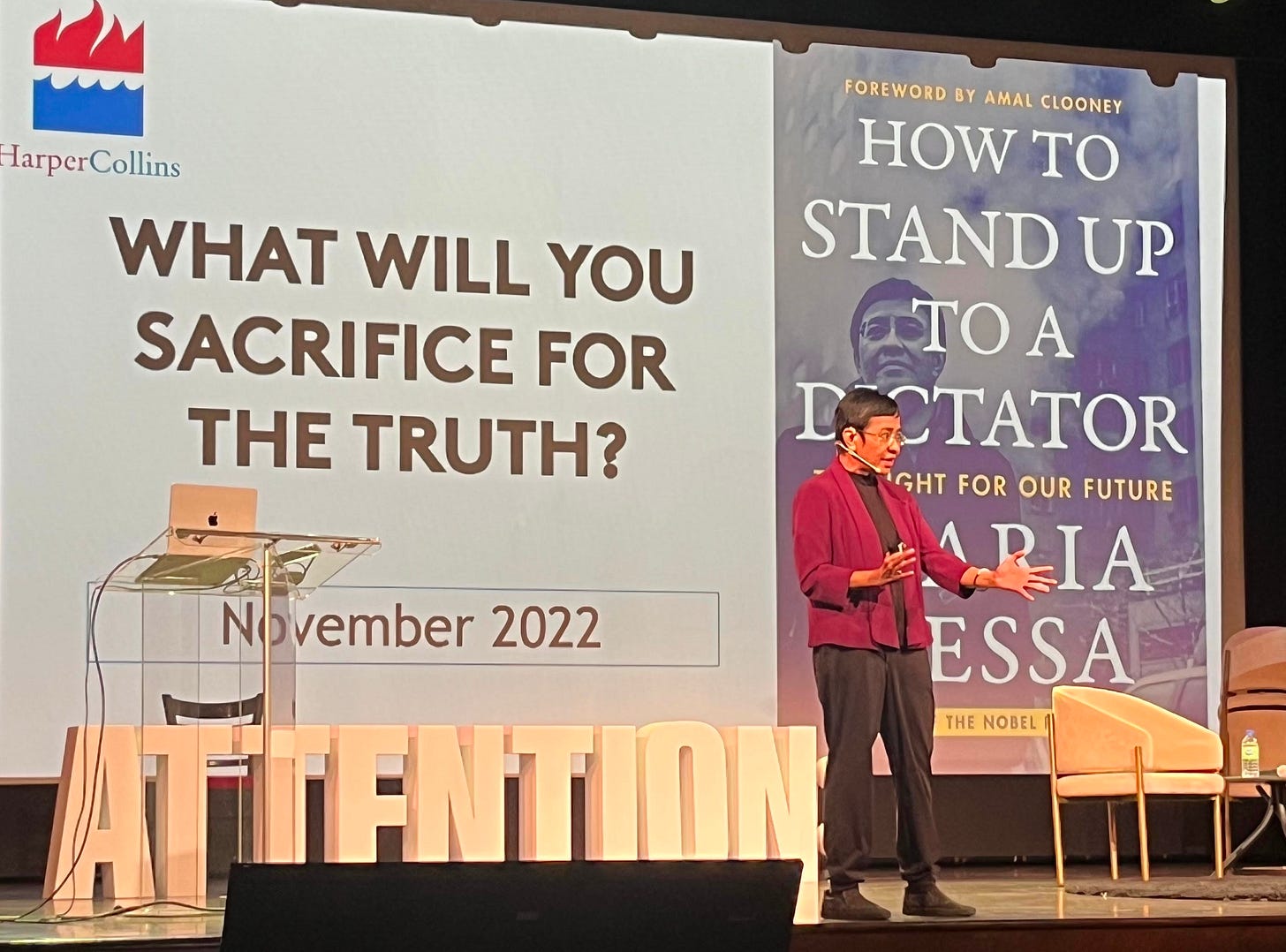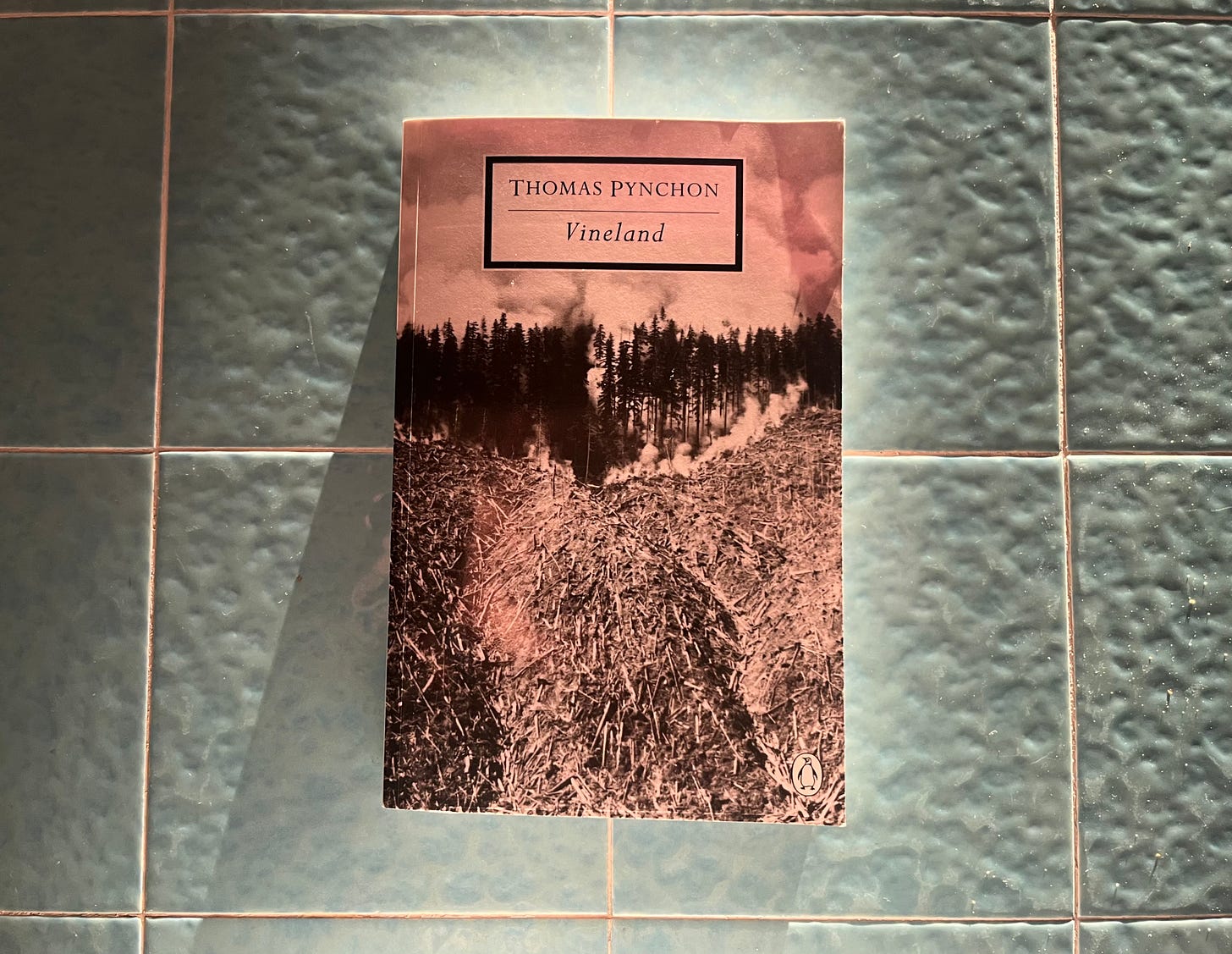Zones of freedom
On journalism and digital sovereignty; Thomas Pynchon's "Vineland."

I was toting Thomas Pynchon’s “Vineland” around Montreal this week while attending an excellent conference on tech+democracy called “Attention: Govern or Be Governed.” I had been invited to talk about whether journalism can survive AI. Briefly, if you want a vibrant culture sector in the AI age that doesn’t treat you like a complete idiot, you’ll probably have to 1. declare a Butlerian Jihad on behalf of copyright and/or 2. do subsidies. I work on the subsidies.
But it’s the human factor I find the major underdiagnosed problem these days, the spiritual crisis now gripping many journalists and democracy enthusiasts. “What is civic engagement in the age of exponential lies?” Maria Ressa, the dissident journalist and Nobel laureate, asked the audience. A young journalist who pulled me aside didn’t want to talk policy but my thoughts on the moral dimensions of Ezra Klein’s recent intellectual collision with Ta-Nehisi Coates. Who a journalist is for. She was Team Coates. I said at least Klein was honest about not knowing what his role is anymore. He told the truth.
The pervasive disjointedness among media workers and democracy promoters alike seems less about frustrated aspirations than some basic breakdown in cause and effect, the vacant explanations of what’s good and will be rewarded. No useful rubric for accurately predicting how the world will self-improve with our timely assistance. I dog-eared a page in Pynchon’s “Vineland” about the anomie of an old craft when subverted, “made cruel and more worldly, bled of spirit, once eternal techniques now only one-shot and disposable, once greater patterns now only a string of encounters, single and multiple, none with any meaning beyond itself.” During a conference break, I chatted with an accomplished acquaintance from the world of literary journalism about how she was doing. She said she couldn’t think of anybody right now who has her dream job. She’s also increasingly reading novels.
We’re seeking something in fiction we can’t find in the world. I think it’s freedom.
A major theme these days outside the U.S. is the need for “digital sovereignty,” especially now that America’s tech monopolies are fused with the Trump First agenda. To become sovereign — to control the most meaningful decisions about your own existence — is to exit an existing status quo, sometimes at steep cost. Could be a democratic nation risking American tariffs to build a domestic tech sector, or a journalist sacrificing the reach of extractive platforms like YouTube or Instagram to build more independent modes of distribution. In some fundamental way, it’s the public that gets deprived while you retool your national or personal economy for independent production. A major theme of the conference was that many of our laws and principles already set sensible and balanced criteria for handling for new technologies, new situations. But we’re principally held back by the fear that enforcing those principles will be costly and won’t be popularly supported. That’s a crisis of confidence.
Of course, the basic solution to any crisis of confidence is to be brave — easier said than done. In Montreal I got quizzed about how Americans are receiving Trump II, and I had to shrug a little. The approval ratings are plummeting and there’s rank-and-file anger in lots of places, which doesn’t seem reflected in the temper of elite institutions or leadership. The government is shut down without end and goon squads roam the streets. Everybody seems waiting to see if some kind of karmic rebalancing is going to set in or — is this all there is from now on? “The first half of the decade is a single, shapeless fog,” Václav Havel recalled of his own 1970s. I read my books. “Vineland” is about ex-revolutionaries and weirdos fleeing government repression in totally non-idealistic times, but who find ways to carve out their little zones of freedom. “Every dog has his day,” says the book’s epigram from Johnny Copeland, “and a good dog just might have two days.”



This piece is so good, a mere like is not enough. And “…the hostage-like role of the media consumer encountering the work product of attention-hijackers across all platforms. Video of a famous person getting shot says — what, exactly? Have I become wiser by encountering snuff footage and the shooter’s shitty little ironic manifestos? When did nihilists start doing so much growth marketing?” All I can say is !!!!!
"the spiritual crisis now gripping many journalists" I don't want my journalists in crisis. Your job is to report, not save us from ourselves.